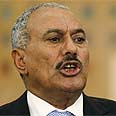
Yemeni leader says he'll step down by year's end
US-backed President Ali Abdullah Saleh says won't hand power to army commanders, claims military coup would lead to civil war
Yemen's embattled US-backed president said Tuesday that a military coup would lead to civil war and pledged to step down by year's end but not hand power to army commanders who have joined the opposition.
"Any dissent within the military institution will negatively affect the whole nation," President Ali Abdullah Saleh said in a nationally televised warning to a meeting of Yemen's Supreme Council of the Armed Forces. "The nation is far greater than the ambition of individuals who want to seize power."
There was no immediate response from the opposition, which has won the loyalty of influential clergy and tribal leaders, along with the powerful army commanders now calling for Saleh's ouster.
Saleh had rejected an earlier opposition demand that he resign by the end of the year.
Presidential spokesman Ahmed al-Sufi told The Associated Press that Saleh met with senior Yemeni officials, military commanders and tribal leaders Monday night and vowed not to hand power to the military. He said the Monday defection of military commanders including longtime confidante Maj. Gen. Ali Mohsen al-Ahmar was a "mutiny and a coup against constitutional legitimacy."
"I don't wish and will not accept the transfer of power to the military," al-Sufi quoted Saleh as saying. "The military institution remains united. The era of coups is gone."
Al-Ahmar, commander of the army's powerful 1st Armored Division, deployed tanks and armored vehicles at the Defense Ministry, the TV building, the Central Bank and a central Sanaa square that has become the epicenter of the monthlong, anti-Saleh protests.

Protestors in Sana'a (Photo: Reuters)
In response, the Republican Guards, an elite force led by one of Sale's sons, deployed troops backed by armor outside the presidential palace on the capital's southern outskirts.
The rival deployments created a potentially explosive situation at the city as news of a flurry of protest resignations by army commanders, ambassadors, lawmakers and provincial governors stepped up pressure on Saleh, Yemen's leader of 32 years, to step down.
Al-Ahmar's defection was seen by many as a turning point.
Speaking in Paris on Monday, French Foreign Minister Alain Juppe called Saleh's resignation "unavoidable" and pledged "support to all those that fight for democracy."
Calling Al-Ahmar's defection "a turning point," Edmund J. Hull, US ambassador to Yemen from 2001 to 2004, said it showed "the military overall ... no longer ties its fate to that of the president."
"I'd say he's going sooner rather than later," Hull said.
In a sign of the Obama administration's growing alarm over the regime's crackdown on demonstrators, State Department spokesman Mark Toner called on the Yemeni leader to refrain from violence.
"We abhor the violence. We want a cessation of all violence against demonstrators," Toner said, calling on Saleh to "take the necessary steps to promote a meaningful dialogue that addresses the concerns of his people."
- Follow Ynetnews on Facebook










